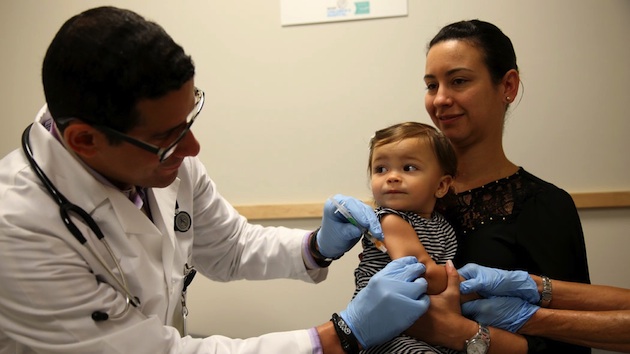

In Mommy Truce, Pulitzer Prize-winning columnist Connie Schultz tackles the issue of vaccines, and overall parenting skills and challenges in light of news.
The current controversy over whether parents should be forced to have their children vaccinated for measles is one of the painful signs of our times. Measles was virtually wiped out in the United States, years ago. Why the resurgence of this disease now?
The short answer is that false claims, based on other false claims, led many parents to stop getting their children vaccinated against measles.
The key false claim was that the vaccine for measles caused an increase in autism. This claim was made in 1998 by a doctor writing in a distinguished British medical journal, so it is understandable that many parents took it seriously, and did not want to run the risk of having their child become autistic.
Fortunately, others took the claim seriously in a very different sense. They did massive studies involving half a million children in Denmark and two million children in Sweden. These studies showed that there was no higher incidence of autism among children who had been vaccinated than among children who had not been vaccinated.
Incidentally, the “evidence” on which the original claim that vaccines caused autism was based was just 12 children. But the campaign to convince the public was a masterpiece of propaganda.
The story line was that pharmaceutical companies who produced the vaccine were callously risking and sacrificing helpless children in pursuit of profit. This is the kind of dramatic stuff the media love. It never seemed to occur to the media that lawyers who were suing pharmaceutical companies had a vested interest in this story line that the media fed on to the public.
Unfortunately, it takes time to run careful scientific studies, involving vast numbers of children in different countries. That allowed the propaganda against vaccines to go on for years. Eventually, however, the results of the studies so completely discredited the claim that the measles vaccine caused autism that the medical journal which had published the article publicly repudiated it. The doctor who wrote the article had his license revoked.
By this time, however, there was a whole anti-vaccine movement, and crusading movements are seldom stopped by facts.
This was not the only false claim involved. What made that claim seem plausible was a highly publicized increase in the number of children diagnosed as being autistic or being “on the autism spectrum.”
What was not so widely publicized was that the definition of “autism” had expanded over the years to include children who would never have been called autistic by the standards set up when autism was defined by its discoverer, Professor Leo Kanner of the Johns Hopkins medical school, back in 1943.
Professor Kanner fought against the expansion of the definition of autism but, after his death, the definition continued to expand — and the number of children who met the expanded definition greatly increased.
There were financial incentives for this expansion. Late-talking children, for example, could get government programs to pay for their treatment if they were designated as autistic or on the autism spectrum.
Despite headlines and hysteria about skyrocketing numbers of children diagnosed as autistic, the number of children who meet the original definition of autism has been relatively stable in recent years, at about one quarter of one percent of all children, according to Professor Stephen Camarata of the Vanderbilt University Medical Center, in his recent book, “Late-Talking Children.”
It may be significant that the number of children regarded as mentally retarded has fallen by numbers similar to the rise in the number of children regarded as autistic. According to Professor Camarata, “This too suggests that changes in definitions and in diagnostic practices are contributing to the perceived ‘epidemic’ of autism.”
Does this mean that vaccines are safe? In a categorical sense, nothing on the face of the earth is 100 percent safe — including going unvaccinated. But the claim that vaccines cause autism has been discredited by evidence.
Some say the decision to vaccinate or not should be the parents’ choice. That would be fine if their child would live isolated from other children. But that is impossible.
Thomas Sowell is a senior fellow at the Hoover Institution, Stanford University, Stanford, CA 94305. His website is www.tsowell.com.
The most damning journalistic sin committed by the media during the era of Russia collusion…
The first ecological study finds mask mandates were not effective at slowing the spread of…
On "What Are the Odds?" Monday, Robert Barnes and Rich Baris note how big tech…
On "What Are the Odds?" Monday, Robert Barnes and Rich Baris discuss why America First…
Personal income fell $1,516.6 billion (7.1%) in February, roughly the consensus forecast, while consumer spending…
Research finds those previously infected by or vaccinated against SARS-CoV-2 are not at risk of…
This website uses cookies.
View Comments
I am wondering if you have ever read the insert to the MMR ll vaccine I feel to really round out your commentary that you should include the link from the FDA so that a reader can make a more informed and educated choice (warnings, reactions, and contridictions) http://www.fda.gov/downloads/BiologicsBloodVaccines/Vaccines/ApprovedProducts/UCM123789.pdf
Also for the latest statistics on the rate of Autism visit the CDC website where you will learn currently as of 2010 the rate is 1 in 68 children in the USA a 30% spike from previous estimations http://www.cdc.gov/media/DPK/2014/dpk-autism.html
http://benswann.com/truth-in-media-vaccine-court-and-autism/